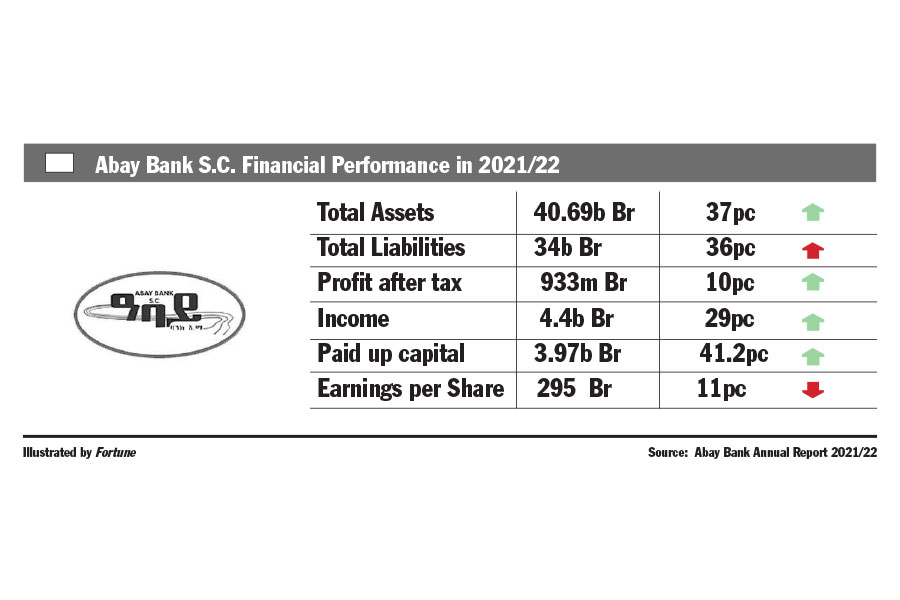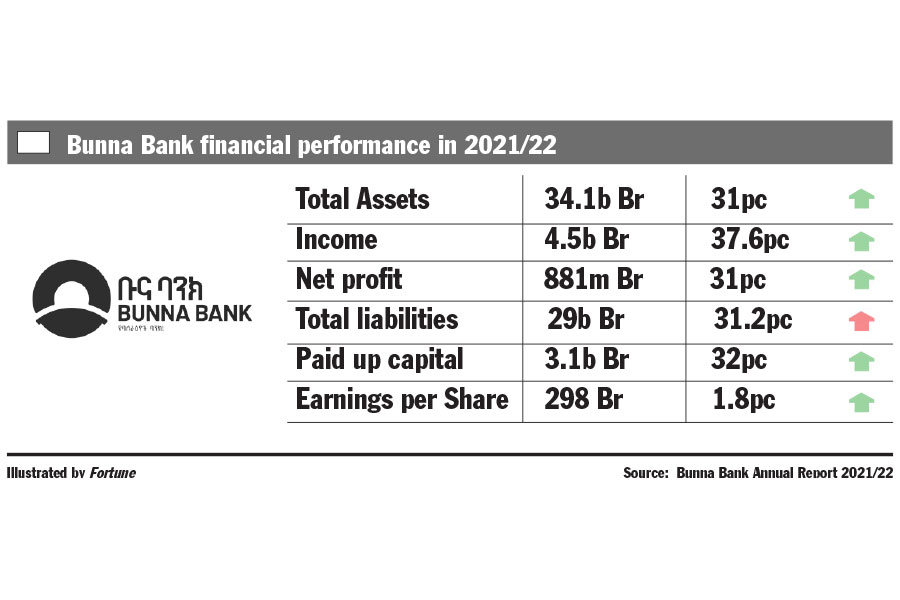
Fortune News | Jun 04,2022
Dec 21 , 2019
By Senay Lemma , Solomon Girma
Ethiopia has gained a reputation as one of Africa’s fastest-growing economies in the last 15 years. Perhaps until 2016, the International media has widely showcased the country’s growth performance and credited the government with clarity of vision and commitment for growth. Yet the Ethiopian economy has failed miserably in terms of generating a sufficient number of jobs for the country’s growing young population. As stellar as it is, the growth of the past decade and a half can be characterized as "jobless growth".
This has in part to do with extremely high labour supply, as Ethiopia has seen an influx of young people entering the labour market. In fact, in the past five years, nearly half a million young graduates have joined the labour market. While exact data is not available, the economy has not succeeded in creating jobs for a sizable portion of this job-seeking population. Joblessness is especially a pressing problem in urban areas, where a record high migration from rural youth further creates massive job demand that is not matched by the economy’s employment potential.
A recent World Bank report has revealed that at least 11 million Ethiopians, about one-tenth of the population, are unemployed. Some two million join the job market every year where they struggle to find suitable job openings. It is not surprising, therefore, that youth unemployment in urban and rural parts of the country has contributed to the social and political turmoil the country is facing. Especially since 2015, youth unemployment has been cited as an immediate cause of the growing social unrest and mass protests that have weakened political stability in the country.
Until recently, the challenge of job creation has not been handled sufficiently by Ethiopia’s growth and transformation plans. The government of Prime Minister Abiy Ahmed (PhD), which came to power in April 2018, seems to recognize the need for urgently improving the employment prospects of Ethiopia’s youth. Soon after coming to power, Abiy installed a new cabinet that has been entrusted with the weighty responsibility of bringing peace and stability. In recognition of the severe social and political impacts of youth unemployment to the country, Abiy’s government has made it a top policy priority to create jobs for millions of young citizens. The Prime Minister stressed this important responsibility in one of his most recent public remarks, where he stated, “The development and growth of Ethiopia will be measured by the number of jobs created."
The formed Job Creation Commission aims to generate at least three million jobs per year and a total of 14 million jobs over the coming five years. This will require significant policy reforms toward extending access to education, improving infrastructure, and attracting local and foreign investment. We have seen a large number of commendable initiatives that aim to address this pressing problem. The current economic policy aims to create a vast number of jobs by developing several economic sectors including tourism, mining, ICT and agriculture.
The Investment & Jobs Creation National Committee and the Doing Business Committee, both of which are led by the Prime Minister, have already marked key milestones toward enabling greater job creation by the private sector. A national entrepreneurship strategy has also been launched to enable greater venture creation by supporting entrepreneurs.
These are astounding policy initiatives, but their success will depend on the government’s ability to coordinate their successful implementation. The country has immense opportunities for economic growth, which the government should successfully exploit to create jobs for the unemployed. If effectively implemented, there is no question that these policy initiatives will go a long way toward relieving the deep causes of social unrest that are introducing political instability.
How should these multiple policy initiatives be oriented to overcome Ethiopia’s legacy of jobless growth?
The following policy areas should receive due consideration if Ethiopia’s growth is going to advance inclusive growth and prosperity for its millions of job-seeking youth.
The government must make genuine efforts to advance agricultural transformation. Ethiopia is an agrarian economy with a large share of the population living on agriculture. A key policy priority, therefore, should be modernising agriculture to increase the sector’s productivity and boost the country’s ability to feed itself. This needs to be attended by other policy interventions to develop economic sectors that can absorb the workers who are shed by a modernized and productive agricultural sector. The best way to do so is developing new labour-intensive economic activities such as agribusiness, light manufacturing and services that have strong forward and backward linkages with agriculture. Effective development policy should thus anticipate and prepare for increasing urbanisation that results from agricultural transformation. As the population moves from rural areas to urban areas, the government needs to develop diverse urban development programmes that create industrial and service jobs. The gradual shift of labour away from low-productive agricultural sectors to high-productive manufacturing and service sectors will eventually boost income per capita and productivity.
There also is a need for boosting the growth and competitiveness of the private sector. The government has rightly emphasised the importance of small and medium enterprises for job creation. Indeed, the private sector is slowly becoming a major employer in larger cities across the country, particularly in Addis Abeba. Unfortunately, it is beset by significant structural constraints that limit its ability to become a reliable mechanism for job creation. A vast array of policy initiatives are needed to alleviate pressing constraints and boost the competitiveness and job creation potential of the private sector. For example, there is a need to facilitate access to credit and other forms of capital to small and medium enterprises that face severe financial constraints. Public-private partnerships can be used as a development strategy to boost the investment and productive potential of the fledgling private sector. The government should also foster a favourable regulatory environment and facilitate access to crucial infrastructure including land and basic services like water and electricity. There is particularly a need for a fundamental shift in the role of government from being a sole provider of jobs toward becoming an enabler of job creation through private sector growth.
There is a need to make significant investments on human capital development. To realise the productive potential of Ethiopia’s youth, there is a need for a systematic and sustained policy effort toward building the professional and technical expertise of the youth.
This requires heavy investment in universities and vocational institutes to provide targeted programmes that advance skills development and professional training in various fields, including technical skills and science and technology. In recognition that the job market of the 21st century is changing radically, there is a need to focus on ICT and digital skills, while also building the capacity of the youth in entrepreneurship and business development. Building the human capital of the youth should be the mainstay of the government’s strategy to facilitate the country’s transition toward a modern and competitive economy.
Correspondingly, there is a need to link the country’s education and training programmes with overall economic growth and transformation strategies. For example, universities and colleges should be encouraged to use the recent Homegrown Economic Reform Agenda as a blueprint for designing their curriculum and skill formation strategies. This ensures that there will be a match between the demand and the supply side of the labour market.
Where necessary, the relevant government ministry offices should work closely with the private sector and universities to aid them in aligning their education and training programmes with the overall economic growth and transformation plan. To gauge the jobs created and to formulate and adopt good policies at the macro level, the Job Creation Commission should provide timely and reliable labour market information and statistics for all its stakeholders. Moreover, the government should also make sure that the selection and appointment of bureaucrats is based on merit rather than mere political affiliation.
The experiences of other successfully industrialised countries in East Asia and elsewhere suggests that the daunting employment challenges that are facing Ethiopia are not unsolvable. They only need a persistent and clear-eyed strategy to pursue a policy of economic growth that delivers employment opportunities at the required volume and pace.
PUBLISHED ON
Dec 21,2019 [ VOL
20 , NO
1025]

Fortune News | Jun 04,2022

Viewpoints | Jun 24,2023

Fortune News | Mar 18,2023

Radar | Oct 31,2022

Fortune News | Nov 09,2024

In-Picture | Feb 24,2024

Fortune News | Mar 04,2023

Commentaries | Feb 18,2023

Viewpoints | Jun 29,2024

Fortune News | May 20,2023

My Opinion | 131590 Views | Aug 14,2021

My Opinion | 127946 Views | Aug 21,2021

My Opinion | 125921 Views | Sep 10,2021

My Opinion | 123545 Views | Aug 07,2021

Dec 22 , 2024 . By TIZITA SHEWAFERAW
Charged with transforming colossal state-owned enterprises into modern and competitiv...

Aug 18 , 2024 . By AKSAH ITALO
Although predictable Yonas Zerihun's job in the ride-hailing service is not immune to...

Jul 28 , 2024 . By TIZITA SHEWAFERAW
Unhabitual, perhaps too many, Samuel Gebreyohannes, 38, used to occasionally enjoy a couple of beers at breakfast. However, he recently swit...

Jul 13 , 2024 . By AKSAH ITALO
Investors who rely on tractors, trucks, and field vehicles for commuting, transporting commodities, and f...

Jun 28 , 2025
Meseret Damtie, the assertive auditor general, has never been shy about naming names...

Jun 21 , 2025
A well-worn adage says, “Budget is not destiny, but it is direction.” Examining t...

Jun 14 , 2025
Yet again, the Horn of Africa is bracing for trouble. A region already frayed by wars...

Jun 7 , 2025
Few promises shine brighter in Addis Abeba than the pledge of a roof for every family...

Jun 29 , 2025
Addis Abeba's first rains have coincided with a sweeping rise in private school tuition, prompting the city's education...

Jun 29 , 2025 . By BEZAWIT HULUAGER
Central Bank Governor Mamo Mihretu claimed a bold reconfiguration of monetary policy...

Jun 29 , 2025 . By BEZAWIT HULUAGER
The federal government is betting on a sweeping overhaul of the driver licensing regi...

Jun 29 , 2025 . By NAHOM AYELE
Gadaa Bank has listed 1.2 million shares on the Ethiopian Securities Exchange (ESX),...